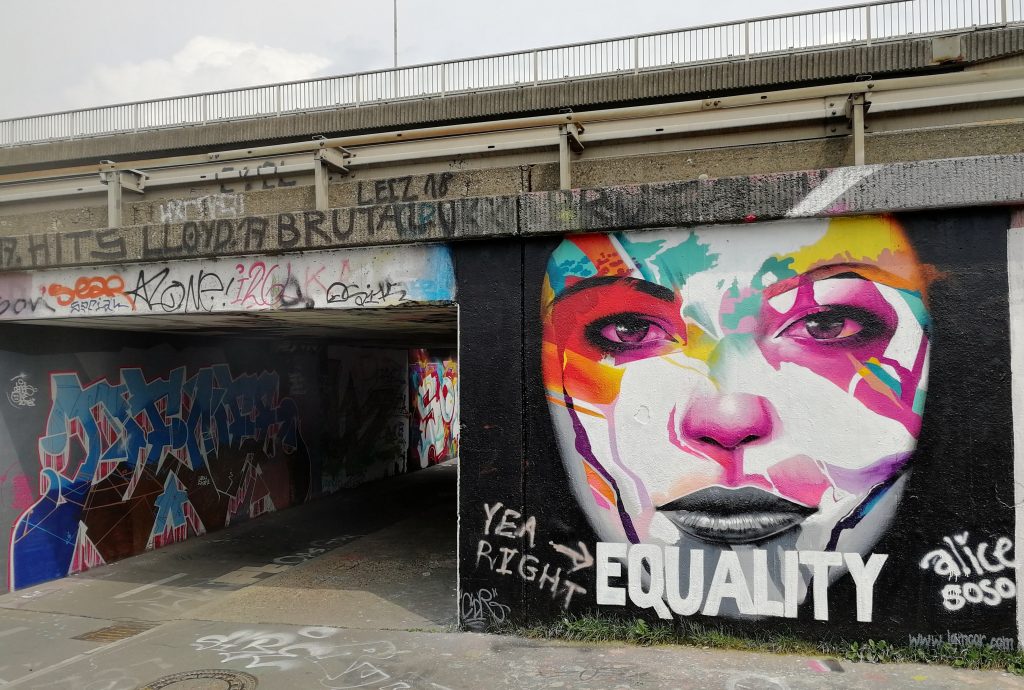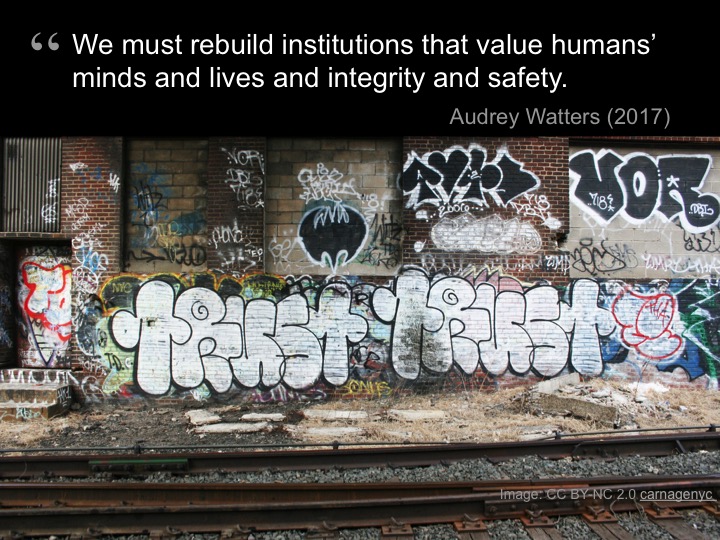
I initially qualified and worked as an engineer, but for the past 25+ years I have worked as an educator — mostly in higher education, but also in different community contexts and in the tech industry. At ALT’s 25th annual conference next month, Frances Bell and I will facilitate a workshop titled: A personal, feminist and critical retrospective of Learning (and) Technology, 1994-2018. In preparation for that session, I have reflected on my path as an educator and Frances has done the same — here is the link to Frances’ post. At the conference, we plan to knit together these reflections with an analysis of ALTC trends since 1994. Here in our blogs and on Twitter (using #altc and #femedtech), we would like to invite broader participation in the discussion and, hopefully, take the work further after the conference.
Personal reflection
After earning my BSc degree in Mechanical Engineering, I worked for several years in the tech industry (at Xerox and DEC). Starting out as a process engineer, I quickly moved into systems analysis and software engineering, also studying part-time to earn an MEng degree in Systems Engineering. The experience of working as a female engineer in the 1980s was… well, perhaps not much different than it is today (more on that later). I was one of only 10% of mechanical engineering graduates in my class who were women; and in two different workplaces, in manufacturing engineering and systems engineering, I was also in a very small minority. I remember saying to friends at that time that although I enjoyed my work as an engineer, it felt as if I “couldn’t bring my whole self into work”.
Partly as a result of that experience, in 1990 I enrolled for a Graduate Diploma (and then an MA) in Women’s Studies — an experience which changed the course of my career, and in many ways, my life. Another reason for signing up for the Women’s Studies programme was a recognition that many of the things that I loved in life — literature, history, culture — had been absent from my engineering education. The opportunity to study those subjects, in the context of a brand new Women’s Studies programme (at the University of Limerick), was too enticing to pass up. Over the next three years, I engaged in a body of work — and a way of learning — that stoked a fire within me. In studying Women’s Rights in History, Philosophical Approaches to Gender, Sociology of Education, and more, I engaged with literature in the areas of gender and science/technology, standpoint epistemology, and feminist pedagogy. For the first time, I encountered work by Audre Lorde, Donna Haraway, Sandra Harding, Cynthia Cockburn, and Paulo Freire. I learned how and why women’s contributions, in all areas of life, have often been ignored, unrecorded, or erased. I learned concepts and a language with which to understand my experiences as a woman in engineering and put those personal experiences in a larger social context. And crucially, just on the cusp of third-wave feminism, our learning in the UL Women’s Studies programme was not limited to exploring gender as a category of difference, but rather the multiple ways that human beings are marginalised and oppressed in societies and cultures where power is organized hierarchically by race, class, gender, and more.
During the 1990s, following completion of my MA, I made personal and career choices that enabled me to work further in this area.
Research: I participated in a 3-year research project Winning Women in Science, Engineering, and Technology (funded by the Scottish Higher Education Funding Council, 1995-97) exploring women’s access to, participation in, and progression in SET (now STEM) in higher education. The initiative had its roots in the growing awareness of the problem of the underrepresentation of women in SET (for women and for society). Along with another researcher on this project, Angela Roger, I wrote a deeper analysis of the issues explored in the research project and critiqued some of the issues we encountered in publishing the results: Theorizing Progress: Women in Science, Engineering, and Technology in Higher Education. [I had no idea then that 20+ years later, after justifying the need (based on a wealth of global evidence) for changing the white/Western/masculine culture of science and technology — rather than changing girls/women to fit into that culture — I’d still not go a day without reading about the continuing underrepresentation and marginalisation of women in STEM, ‘tech bro’ culture, and the need for still more role model and mentoring programmes (i.e. fixing women).]
Teaching: I worked as a tutor with the Open University in Scotland, teaching both Issues in Women’s Studies (U207) and Introduction to Information Technology: Social and Technological Issues (DT200). The former enabled me to learn and practice more deeply the principles of feminist pedagogy, while the DT200 module broke new ground at the OU by enabling distance students to communicate with one another using a text-based, asynchronous conferencing system (CoSy). [Although I was not aware of ALT in these years, a 1998 paper by Wilson and Whitelock in ALT-J explored the use of CoSy in DT200 and other OU courses: Is it sustainable? A comparison of student and tutor online time across three distance-learning courses.]
Community education: I also developed and facilitated women in technology and gender and technology workshops and courses in several different community settings, mostly for women in disadvantaged communities who were hoping to re-enter the workforce. These included courses in Letterfrack, Renmore, and Galway (Ireland) and Stirling University Adult Education and the Alloa Women’s Technology Centre (Scotland).
Personally, during the 1990s I lived and worked in Ireland, Scotland, and the US, and continued to engage in political and feminist activism, as well as becoming a mother of two children. In 2000, we settled in Galway and my technology, education, and feminist work converged in new ways, mainly based at the National University of Ireland, Galway (as well as continuing community education activities).
My awareness of ALT was still to come. During the early 2000s, my work at NUI Galway was not defined as ‘learning technology’, although it evolved in that direction through working both as a lecturer in IT and academic coordinator of online IT programmes. Mostly, this was a time of synthesis. Rather than teaching specifically in the area of gender and technology, my work as an educator was driven by a commitment to feminist/critical pedagogy and an awareness of, and efforts to reduce, multiple forms of inequality.
From the mid- to late 2000s, I began to encounter open education — early MOOCs as well as work by danah boyd, Mimi Ito, Alec Couros, Howard Rheingold, Cathy Davidson, and Bernie Goldbach, among others. I began using open practices in my teaching, initially on my own but increasingly in collaboration with others (e.g. #icollab), as well as advocating for openness at programme, institutional, and broader levels. My awareness of ALT grew, through the journal Research in Learning Technology and through following the conference #ALTC via the website and Twitter. I also participated in the conference in 2014, when I was invited to give a keynote, and in 2015, where I collaborated with Vivien Rolfe in a session on openness.
Part of the experience of spanning different fields of study across many years is the opportunity (and often the frustration) of observing missed opportunities and instances of ‘reinventing the wheel’. Long-standing work in critical and feminist pedagogy, for example, was not often acknowledged in later work about MOOC/online/open teaching and pedagogy. Acknowledgement and analysis of earlier work is vitally important in education — as exemplified in Audrey Watters’ activist scholarship (especially re: teaching machines) and Martin Weller’s 25 years of Edtech series, for example. But there are also advantages of spanning different fields, sectors, and countries — in my case, working as both a technology professional and an educator, equipped with analytical tools to address power and inequality. After working for a number of years as an open educator, I chose to embark on a PhD in 2013 (finishing earlier this year), giving me an opportunity to draw together many different strands of research and take this work forward in new ways. My driving motivation remains the same: reducing inequality; respecting, trusting, and supporting learners; fostering learner agency; using/building technology that is as healthy and liberatory as possible; and working to rebuild systems and institutions that, in the words of Audrey Watters (2017), “value human’s minds and lives and integrity, and safety”.

..
The personal is political; education is political; openness is political. There remains much work to be done.
****************
As a next step, Frances and I will examine some of the key themes of ALTC during the past 25 years (particularly in the areas of Open/Active Learning and Community/Communities of Practice) and explore how our personal experiences intersect and compare with it. What can we learn, and how might such analysis help us to move forward? And what of your experiences? We look forward to your thoughts and ideas.
..
References:
Audrey Watters (2017). Ed-Tech in a Time of Trump. Hack Education.
Martin Weller (2018). 25 Years of Ed Tech series. The Ed Techie.
Image: Equality, CC BY-NC juergo (Flickr) https://www.flickr.com/photos/juergo/41125878855
Though it’s difficult to write something so personal, I’m really glad that we have both posted our reflections so that we can take the next steps in preparing for our interactive session at ALTC. We have quite a lot in common and also some complementary experiences. I know I have and will benefit from your extensive scholarship from your Women’s Studies MA.
Reading your post reminded me of what I missed out. It was great to read about your extensive work in Community Education – you have been an inspiration to me in the voluntary work I have been doing in retirement. One of my great hopes for ALT is that it will increasingly influence Informal and Community Education, and reading Maren’s hopes http://marendeepwell.com/leadership/beyond-hype-or-dystopia-looking-ahead-to-alts-annual-conference-2043/ gives me confidence that this will happen.
It’s great working with you 🙂